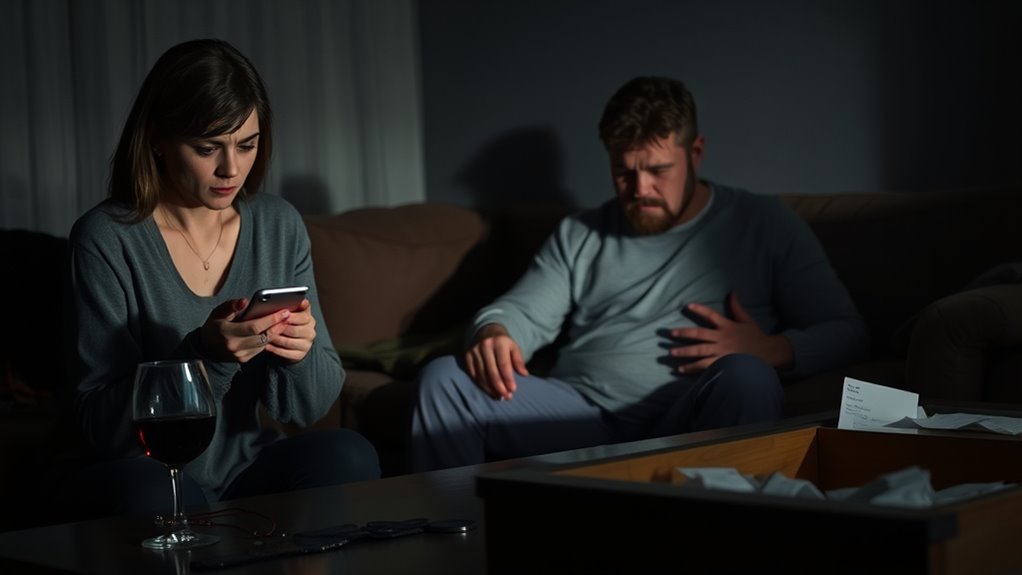If your partner starts acting distant, hides their phone, or becomes more secretive, it could be a red flag. Watch for sudden changes in grooming or social habits, like staying out late or making excuses for avoidances. Increased irritability or stress may also hint at guilt. If they’re avoiding sharing details or becoming more guarded, these signs might point to infidelity. Keep listening, as there’s more to uncover that could explain these behaviors.
Key Takeaways
- Sudden change in communication patterns, such as secretive texting or avoiding sharing details about plans.
- Increased privacy measures like changing passwords or locking screens more frequently.
- Noticeable shifts in grooming, dress, or social activities without clear explanation.
- Inconsistent excuses for absences or unavailability, raising suspicion.
- Changes in mood, withdrawal, or irritability that may indicate guilt or stress.

When you notice changes in your partner’s behavior, it can raise suspicions that they might be cheating. You start to see little things that seem off—less affection, secretive phone use, or unexplained absences. These signs can be subtle at first but tend to pile up over time. Maybe they become more guarded with their phone, hiding the screen when you walk by or quickly closing tabs or apps. If you used to share everything, and now they keep things to themselves, it’s natural for your mind to wonder what they’re hiding. Pay attention to shifts in their communication style; they might be more distant, less interested in conversations or intimacy, or even more irritable than usual. These changes often stem from guilt or stress related to secretive behavior, so they’re worth noting.
You might also notice a sudden increase in their need for privacy. Perhaps they’re locking their phone more often or changing passwords without explanation. If your partner used to be open about their whereabouts but now avoids sharing their schedule, it could be a red flag. They might start making excuses for their actions, like claiming they’re too busy or tired, but when these excuses become frequent or inconsistent, it’s worth questioning. Sometimes, people cheat because they’re seeking validation or excitement outside the relationship, and their actions reflect that need for distance or escape.
Another sign is a change in appearance or grooming habits. If your partner suddenly starts dressing differently, working out more, or paying extra attention to their looks, it might be linked to a desire to impress someone else. While this isn’t always a sign of cheating, it’s a clue worth considering if it coincides with other suspicious behaviors. Additionally, their social life might change—more late nights out, new friends, or unexplained absences from shared plans. Notice if they become evasive about their whereabouts or if they’re less available for quality time together. These shifts often happen when someone is trying to hide a new relationship or connection.
Trust your instincts but also look for consistency in their actions. Sudden, unexplained changes combined with a sense that they’re hiding something can be a strong indicator. Keep in mind that these signs are not definitive proof but rather signals that warrant a candid conversation. If you’re feeling uneasy, approaching the topic calmly and honestly can help clarify what’s really going on. Remember, trust is built on openness, and addressing your concerns directly might be the best way to understand whether your partner’s actions are innocent or something more serious. Additionally, understanding the digital literacy of your partner can help interpret their behavior and communication patterns more effectively.
Frequently Asked Questions
How Can I Confirm My Suspicions Without Accusing My Partner?
If you’re trying to confirm your suspicions without accusing your partner, start by observing their behavior calmly and objectively. Look for consistent changes, like secretive phone use or unusual schedules. Communicate openly and express your feelings without blame. Ask gentle questions to understand their perspective. Trust your instincts, but avoid jumping to conclusions. Gathering facts thoughtfully helps you make informed decisions without causing unnecessary conflict.
What Should I Do if I Find Evidence of Infidelity?
Finding evidence of infidelity hits you like a thunderclap, leaving you stunned. First, take a breath and process your feelings before acting. Approach your partner calmly, expressing your concerns without accusations. Communicate openly to understand their perspective. If trust remains broken, consider counseling or taking time apart. Remember, addressing this thoughtfully helps you find clarity and decide your next steps, rather than reacting impulsively.
Are There Emotional Signs Indicating a Partner Might Be Cheating?
You might notice emotional signs that suggest your partner’s cheating, like increased secrecy, emotional distance, or less interest in spending time together. They could become more defensive or avoid meaningful conversations. You might also see a lack of enthusiasm or warmth that was once there. Trust your instincts and pay attention to consistent changes in their emotional behavior, as these can be subtle indicators of underlying issues.
How Do I Approach My Partner About My Concerns?
When you want to talk to your partner about your concerns, choose a calm moment where you both can speak privately. Use “I” statements to express how you feel without sounding accusatory. Be honest but gentle, and listen carefully to their response. Remember, approaching with empathy and openness helps foster trust and understanding, making it easier to address your worries together.
Can Trust Be Rebuilt After Discovering Infidelity?
Trust, like glass, can shatter suddenly but also be mended with careful effort. After infidelity, rebuilding it is possible if both of you commit to transparency, patience, and open communication. It’s a fragile process that requires time and genuine remorse. You can choose to heal together, but remember, trust restored is never quite the same. With dedication, however, you may find a stronger, more resilient bond emerging from the cracks.
Conclusion
Trust your instincts, notice the subtle shifts, and pay attention to the unspoken words. Watch for the changing routines, the guarded secrets, and the distant silences. Stay alert to the flickering eyes, the hesitant gestures, and the growing walls. Recognize these signs as warning flags, not just fleeting moments. Because in the end, your awareness is the lighthouse guiding you through the storm, helping you see the truth amid the shadows.









